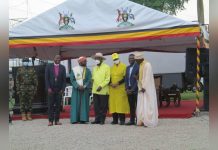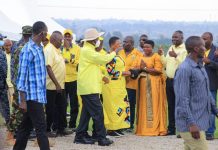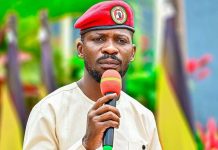Africa-Press – Uganda. President Museveni has ordered that Dr Martin Jerome Aliker be accorded official funeral/burial amid glowing tributes for the former astute entrepreneur and politician who chaired boards of several blue chip companies.
A dental surgeon, Aliker breathed his last at Nakasero Hospital in Kampala due to old age and long illness, his family announced yesterday. He was 95.
“His Excellency, the President of the Republic of Uganda, Gen (Rtd) Yoweri Kaguta Museveni, has granted an official burial to… former minister, Hon Martin Aliker,” Ms Milly Babalanda, the minister for the Presidency, noted yesterday in a post on X, formerly Twitter.
Dr Aliker was a long-time chair of the Board of Publications Ltd, publisher of newspaper, and previously served as junior minister in President Museveni’s government.
Born to Rwot (chief in Acholi ethnic group) Lacito Oketch and Julain Auma at Awaranga Village near Gulu, Dr Aliker’s life was molded for nobility.
He attended King’s College Budo, a school that was established to teach children of the royals and prominent people.
He once told local media that it was painful for him to leave Budo.
He completed his studies at Makerere University where the management decided to send him for further studies in the United States of America.
Although he was from a royal family, his family didn’t have enough money to support his education. During his stay at Budo, he cultivated a lot of friends from several parts of Uganda, who later ended up in high-profile offices.
He got a sponsorship from a Fullbright travel grant that enabled him to travel to the USA in the 1950s.
In 1958, during his dentist’s education in the USA, he met Camille, whom he married a year later.
When he returned to Uganda, he developed contacts like Sir Edward Muteesa, the Kabaka of Buganda then.
He briefly worked for the government up to 1960 when he resigned and set up his private clinic, becoming the first black person to do so.
In an interview with NTV Uganda, he said: “I wasn’t using all the knowledge that I had been given in the United States. The equipment at Mulago [National Referral Hospital] and even at Nakasero [Hospital] were very basic.”
Aliker’s businesses continued to flourish.
In the 1970s, he was appointed the chairman of Uganda Argus, which was one of the biggest newspapers in the country.
The new position at the newspaper, which was considered to be critical of President Idi Amin’s government, landed him in trouble.
“Writing about some people who were disappearing, Amin didn’t like that. So Amin decided that he had to get rid of Martin Aliker. But lucky someone heard him say so. This friend came to me and said ‘look, I heard Amin say kalasi, which meant finish him,” Dr Aliker told NTV Uganda.
With his life in danger, he fled to exile in Kenya on October 1, 1972.
In Nairobi, Kenya, he got a house near the former Kenyan president Mwai Kibaki’s residence.
He said in one year he had turned his life around and made prospects that a hardworking man would make in all his life.
His house and businesses in Uganda were taken over by Amin’s men including the then Inspector General of Police Kassim Obura and later Kampala Governor Abdul Nassur Abdullah.
He stayed in Kenya for more than 20 years but returned in mid-1990s when President Museveni took over power.
Aliker said when he returned, he found his house occupied by people he didn’t know and in a sorry state.
He had to renovate it at a huge cost.
In 1996, President Museveni appointed him the Minister of Foreign Affairs.
Although being a cabinet minister is a life dream for many, Dr Aliker said he didn’t enjoy it because many of his colleagues were so pitiful and had intrigue.
“I wasn’t cut out for that. When I left [in 1999], I was very happy,” he told NTV Uganda.
Soon after leaving cabinet, he was reappointed as a board member of Coca Cola. Several other companies appointed him on their boards.
In his free time, he would play golf and sometimes would attend major entertainment events.
In his old age, he relinquished many of the tasks and spent most of his time at home in Kololo where he would watch the city in peace.
He is survived by a widow, children, and grandchildren.
Source: Monitor
For More News And Analysis About Uganda Follow Africa-Press






